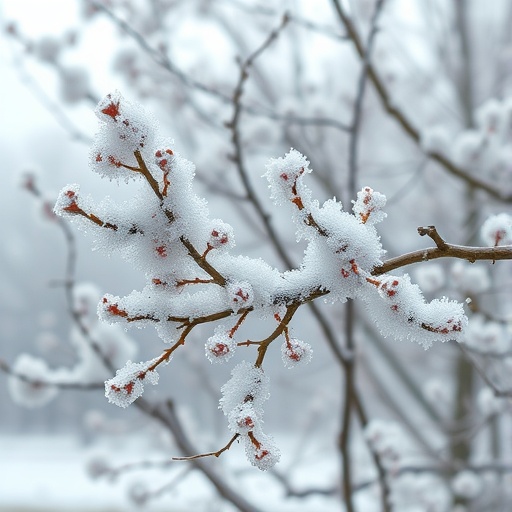Researchers have unveiled pivotal insights into the cold-sensitive response mechanisms of a tropical plant, Mussaenda anomala, through an integrated approach combining physiological, biochemical, and transcriptomic analyses. This groundbreaking research is poised to shed light on the adaptability of plants in fluctuating climates, revealing a robust platform for understanding environmental stress responses in plants that are often overlooked in scientific discourse. As climate change poses increasing challenges to plant resilience, understanding such mechanisms is of paramount importance.
The findings of this study originated from the observation that Mussaenda anomala exhibits specific cold-sensitive traits that impede its growth and overall development at lower temperatures. The research team, composed of Peng, Liu, Tan, and their colleagues, meticulously documented the physiological alterations during exposure to cold stress. They measured changes in chlorophyll content, leaf morphology, and overall plant vigor, which highlighted a dramatic effect of cold temperatures on the plant’s health and productivity.
Additionally, the researchers conducted biochemical assessments that revealed an increase in reactive oxygen species (ROS) production during cold exposure. Elevated levels of ROS can lead to oxidative stress, severely damaging cellular components including membranes, proteins, and nucleic acids. To combat this interference, Mussaenda anomala appears to activate its antioxidant defense system, employing enzymes such as superoxide dismutase and catalase. These findings emphasize the intricate balance that plants must maintain to mitigate stress factors presented by their environment.
The study’s transcriptomic analysis facilitated the dissection of gene expression patterns that are crucial in the plant’s response to cold stress. Through RNA sequencing, key stress-responsive genes were identified, providing a comprehensive view of the molecular pathways activated during cold exposure. These pathways included those for stress perception, signal transduction, and the synthesis of protective proteins, which elaborates how Mussaenda anomala communicates its internal conditions in response to external stressors.
One particularly exciting discovery was the identification of a novel cold-responsive transcription factor that modulates several stress-related genes. This transcription factor appears to orchestrate the expression of various protective mechanisms, catalyzing the plant’s adaptation process. Such molecular understanding can pave the way for future endeavors in biotechnology, where manipulating these pathways might lead to the development of cold-resistant varieties.
Another fascinating aspect of the research was the comparison of cold response traits across various species of Mussaenda. This comparative analysis provided a broader context, depicting how evolution shapes the cold-resistance capabilities differently across plant taxa. Insights gained from Mussaenda anomala could potentially be extrapolated to related species, hinting at a shared evolutionary strategy to withstand cold environments among the genus.
The implications of this research extend beyond academia into the field of agriculture. As global temperatures shift and extreme weather events become increasingly common, the knowledge gained about Mussaenda anomala’s cold sensitivity and its adaptive strategies will be essential for crop breeding programs. In particular, this work reinforces the idea that understanding the mechanisms of stress response can aid in the selection of resilient crops capable of thriving in a changing climate.
Moreover, the integration of physiological, biochemical, and transcriptomic analyses exemplifies a holistic approach to plant research. By pooling together various methodologies, the team succeeded in constructing a multifaceted understanding of cold sensitivity, a characteristic often assessed in isolation. This comprehensive viewpoint is vital, as it mirrors the complexities faced by plants in their natural environments, thereby enriching the body of knowledge pertaining to plant resilience strategies.
Even the statistical results offer a wealth of information, pointing to significant changes under experimental conditions. The consistency of results across multiple experimental iterations strengthens their conclusions, suggesting that the observed phenomena are reliable indicators of the underlying biological processes at play. The reliance on quantitative data fortifies the scientific rigor of their claims, allowing for greater confidence in the implications drawn.
In an era defined by rapid environmental changes, the urgency to understand plant resilience has never been more pressing. The findings from this research contribute to a growing repository of knowledge that illustrates the nuanced responses of flora to climate stressors. With each discovery, scientists move one step closer to engineering solutions that can support food security and biodiversity in the face of climate adversity.
As this research gains traction, it is anticipated that it will inspire further investigations, prompting a surge of interest in cold-sensitive plant species. Prospecting for additional cold-tolerant traits among other plants could lead to significant advancements in agricultural practices, enhancing food production systems that are vitally important for sustaining an ever-increasing population.
Ultimately, the integrated analysis performed by this research team highlights the multifaceted challenges plants face in adapting to their environment and draws attention to the need for continued exploration and innovation in plant sciences. By contributing to the dialogue surrounding climate resilience in plants, this work is a pivotal step toward empowering future generations of researchers and growers to confront the unpredictability of climate change.
This study stands as a testament to the significance of interdisciplinary research in unraveling the complexities of plant responses to environmental stressors. The innovative methodologies applied and the insightful findings reported serve as a blueprint for further studies, ensuring that the essential knowledge of how plants respond to cold stress will not only remain relevant but will also lead to actionable solutions for challenges to come.
Subject of Research: Cold-sensitive response mechanisms in Mussaenda anomala
Article Title: Integrated physiological, biochemical, and transcriptomic analysis of the cold-sensitive response in Mussaenda anomala
Article References:
Peng, Z., Liu, Y., Tan, X. et al. Integrated physiological, biochemical, and transcriptomic analysis of the cold-sensitive response in Mussaenda anomala.
BMC Genomics 26, 1023 (2025). https://doi.org/10.1186/s12864-025-12187-4
Image Credits: AI Generated
DOI: https://doi.org/10.1186/s12864-025-12187-4
Keywords: Cold sensitivity, Mussaenda anomala, physiological response, biochemical response, transcriptomic analysis, climate resilience, antioxidant defense, stress response mechanisms, agricultural biotechnology.
Tags: antioxidant defense systems in Mussaendabiochemical assessments of cold stressclimate change and plant resiliencecold sensitivity in tropical plantsenvironmental stress responses in plantsgrowth impairment in cold temperaturesleaf morphology changes under cold stressMussaenda anomala cold response mechanismsphysiological alterations in cold-sensitive plantsreactive oxygen species in plantstranscriptomic analysis of plant stressunderstanding plant adaptability to climate fluctuations





